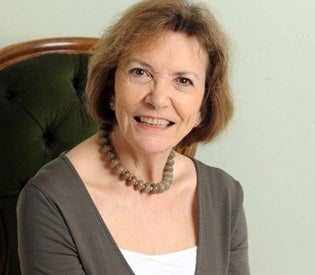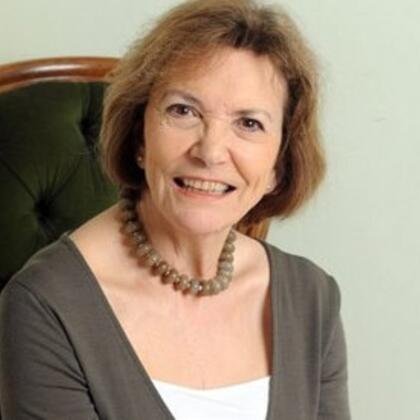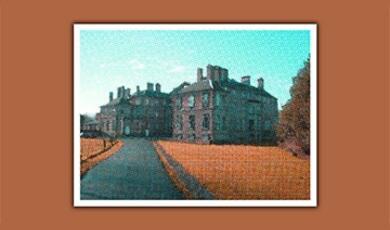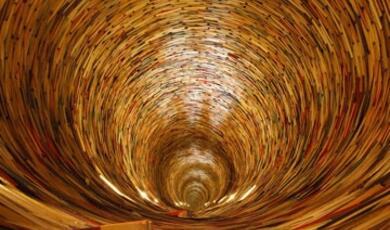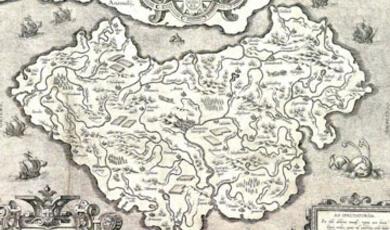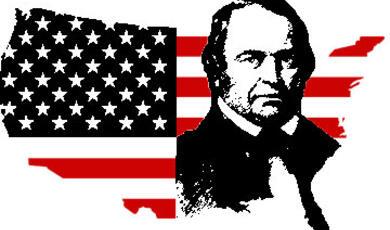The Curse of the poke bonnet: Television's version of history
Share
- Details
- Text
- Audio
- Downloads
- Extra Reading
The Colin Matthew lecture for the public understanding of history.
Download Text
The Curse of the Poke Bonnet:
Television's version of history
Joan Bakewell
I wish to begin this lecture by paying tribute to the man in whose memory it was instituted: Colin Matthew. I did not know him personally, but you do not have to go far in the world of scholarship and history to realise just how much he was admired and loved, and how extensive his influence was, not least in his role as the editor of the Oxford Dictionary of National Biography. His meticulous approach to research and his belief in the importance of both accuracy in reporting the past and wisdom in assessing its significance are virtues to which I pay tribute tonight. It is these very qualities that are called into question by how the public, and thus our children, are sometimes invited to regard history. I hope he would have endorsed what I have to say, and that his wife and his family who are here tonight will do as well.
The curse of the poke bonnet! It was the fashion in the 1820s and onwards. It conceals and blinkers the vision. It is rather silly in its impact. It constrained its wearers, half the population, the women of the time, and it was a thing of straw. I use it, as you will see, as an emblem of some of the things that I have to say about television!
Of all the many quotations about history, that it’s bunk, that it is written by the victors, I have chosen three to flag up my theme. They are as follows:
‘History does not repeat itself; the historians repeat each other.’ That’s Max Beerbohm.
‘Any fool can make history; it takes a genius to write it.’ That’s Oscar Wilde.
And most famously, ‘Another damn big book, scribble, scribble, scribble, eh Mr Gibbons?’ the reported remarks of the Duke of Gloucester on the second volume of Gibbons’ Decline and Fall of the Roman Empire.
I have taken those remarks because they all refer to, acknowledge and indeed endorse the fact that history is something that is written down; that once the research and extensive reading and studying is completed, the outcome will be another fat tome. All my quotations refer to the writing of it, but this is what history is, the written record of what people, historians, believe actually happened.
That is not to neglect oral history of course. Recordings made today by assiduous researchers among the very old who remember the War and the Blitz, and even, like me, the Suez and the Cuba crises. I have recently had occasion to trawl through stacks of such recordings, learning not much, and that often in contradiction to what had just gone before. The memory is suspect. It calls for historians of more application and forensic skill than I have to distil truths from such an avalanche of confused reminiscences.
Yes, books, articles, scholarly dissertations and critiques are the bedrock of the historical record and its impact on the public and, indeed, that is never more abundantly so than right now. In the month before Christmas, great blockbuster books of history are pouring into the shops, flanked by biographies, contemporary commentaries, joke books for children, books of historical maps, and so on. Centuries after it was written, Gibbons’Decline and Fall is still available as an Everyman Classic, currently £19.94 for all six volumes on Amazon, or bidding currently at £4 the lot on EBay! Written history has been, for decades, since universal literacy teaching in schools, the prime, indeed the only, way history was taught and learned. Today things are different.
The way most people learn their history is now from television. It is becoming what I call ‘the curse of the poke bonnet’. It sets up an entirely different engagement with its audience, creating different impressions in people’s minds; but before we get carried away with the iniquity of television compared to ‘real’ history, let’s pay tribute to what history does best: search out and rescue the sources, the words from the mouths of the actual protagonists.
Here’s Voltaire, recording his arrival in London in 1726: ‘It was in the middle of the spring that I disembarked near Greenwich on the banks of the Thames. The sky was cloudless, the air cooled by a gentle west wind. The river was covered for six miles with rows of merchant vessels, their sails all spread in honour of the King and Queen, who were rowed upon the river in a golden barge, preceded by boats and musicians, and followed by a thousand little row boats. Close to the river, on a large green which extends for about four miles, I saw an immense number of comely young people, caracoling on horseback round a kind of racecourse, marked off by white posts stuck in the ground. There were young girls on foot, who were to be in a foot race as well. Some merchants to whom I had letters of introduction got me a horse. They sent for refreshments. They took the trouble to put me in a place where I could easily see. I fancied that I was transported to the Olympian games, but the beauty of the Thames, the crowds of vessels, and the vast size of the city of London soon made me blush for having dared to liken Olympus to England.’
None of that is true. There were no music barges on the river that spring, he had no letters of introduction to local merchants, and if there were foot races, he could not have asked about them because at that time he did not speak English. Voltaire had talked up his arrival to a friend back home. He was showing off. In fact, on his first days in England, he trudged up to Highgate, where he had arranged for there to be a cash transfer, but the banker had gone bankrupt. He went all the way back to Pall Mall, where My Lord and Lady Bolingbroke lived, but found they were in the country. As he later confessed to a friend: ‘I was without a penny, sick to death of a violent ’flu, a stranger, alone, helpless, in the midst of a city wherein I was known to nobody. I could not make bold to see our ambassador in so wretched a condition.’
Well, well, so much for historical record! However, I learned all this from David Bodanis’ book, Passionate Minds: the Great Enlightenment Love Affair, which concerned Voltaire’s involvement with the bluestocking and brilliant mathematician Emilie Du Chatelet, but that detail, quoted from Voltaire’s own letters, is not mentioned in Roger Pearson’s biography of Voltaire, called Voltaire Almighty: A Life in Pursuit of Freedom. Instead, what he tells me, and Bodanis’s does not, is that when Voltaire set foot on the banks of the Thames, on that fine spring morning, he did not know what day it was. In France, it was May 11th 1726, but in the port of Gravesend it was actually 11 days earlier. The English had not yet adopted the Gregorian calendar, first conceived in Catholic Europe in 1582, but only finally adopted in Protestant England in 1752, 26 years after Voltaire’s landing.
In both these books, these particulars are mentioned in the actual text, but they might have been relegated to footnotes. Footnotes are one of the unsung glories of historical works: detailed, precise, full of cross-referencing, and citing of original documents. Television does not do footnotes! So we are immediately aware it is a lighter, less thorough view of history.
The place of history in the television schedules just grows and grows. In 2005/6, the BBC transmitted 487 hours of history programmes across BBC1, 2 and 4. Of these, 80 were first transmissions and 407 were repeats. In the current year, the BBC’s specialist Science and History Department will have delivered 31 hours of history output. They cover such diverse subjects as ‘Rome’, a blockbuster, trailed on the website as ‘Mad emperors, brutal entertainment, and lascivious lifestyles’ …you get the tone! Then there was ‘The Somme’, a sequence of programmes commemorating the 90th anniversary, which prompted a furious argument about the revisionist views expressed in one of the programmes.
The ripples made by these programmes had an interesting sequel, which exemplifies the best of history via television: I mean the web site, and what is called interactive television. Immediately after ‘The Somme’ programmes, some viewers went into action. They took exception to the opinion hinted at in the programme that, in the end, the Battle of the Somme was no bad thing, because the military learned many lessons, and it was technically hailed as a victory. Not surprisingly, this callous judgement enraged people, some of them enough to have them post on the web site personal, memorial reminders of people who had died in that battle. A fine example of what is called interactive television, certainly with a far greater reach than lecture and debate, but not, surely, a substitute for them actually conducted in the flesh. The web site did its best, and I would say it is the next best.
For those Somme programmes, the BBC website also gave us a lecture by Dr Gary Sheffield. He began it in terms quite clearly intended to attract the non-scholar. This is what he wrote: ‘In Blackadder Goes Forth,’ he began, ‘Baldric thought that the war began when the Archduke shot an ostrich because he was hungry’ thus reflecting the public opinion that the issues were not worth fighting for. ‘Most modern scholars,’ he goes on, ‘would not agree.’ His essay is a fine exposition of the causes of the First World War. In both, the audience’s comments and the scholarly lecture, the BBC web gave valuable endorsement to the television transmission.
Other series from the specialist BBC department were ‘In Search of Lost Worlds’, ‘Wild West’, ‘Nuremburg’, and the much loved ‘Time Watch’, which presents a magazine of 12 different stories throughout the year.
But BBC terrestrial channels are only part of the story. There are now two entire channels given over to history, from early morning till late at night – UK TV History and the History Channel, which is available on cable and satellite, owned by Sky.
UK TV is part-owned by the BBC Worldwide company, and transmits 18 hours of history a day for 365 days a year. The daily output is broken into six-hour slabs. The first slab is the first transmission and then it is repeated twice over, and it can transmit a single programme as many as nine times. It is reckoned to be available in 17 million homes, with a reach of 9.4 million people every month. The channel ranks within the top 20 of the non-terrestrial channels. Its philosophy is to go for the big audience, play up anniversaries, D-day, 60 Years of World War II, and such. 80% of its output is archive-based, so that means it is transmitting authentic historical material dressed out in popular presentation. Michael Wood, Neil Ferguson and Tristram Hunt, it was explained to me, would be considered a bit too high brow – my phrase, not theirs.
Channel 4, for its part, transmits 97 hours of history a year, no repeats, and with a philosophy that seeks to be more edgy than the others. They do not, they explained, subscribe to what they called ‘the Alan Bennett view of history’, which they tell me was a man in tweeds in front of a ruin! They deliberately go for a view of history that speaks to the present. Thus we have seen a number of highly original programmes that sent present day people to live in the reconstructed past. ‘The 1940s House’ – I wonder if you remember that? It was a pebble-dashed semi, furnished throughout with 1940s furniture, kitchen utensils, chenille tablecloths and satin eiderdowns. It was so thoroughly re-conceived that it subsequently went on show at the Imperial War Museum. I walked in and straight into my childhood.
In February 2000 a family, Lyn and Michael Harmers and their three children, went to live in the house for the nine weeks, under conditions that prevailed in World War II: rationing, home cooking, no central heating, warden duty for father, war work for mother. It was an inventive way of revealing the past from the point of view of those living it at a most modest level, a people’s war as opposed to the business of politicians and generals.
Another series, ‘That’ll Teach Them’, did the same for education in the ’50s. A class of boys and girls were isolated in a school where they had to submit to the uniforms, school dinners, discipline and severe teaching methods of the 1950s. The rebellious response of the today’s teenagers made clear just how much change had happened within only 50 years; another abject lesson in the nature of change, and how it shapes opinion and political direction. Incidentally, that also reminded me of my youth!
All this is bold and attractive programming, moving well away from the traditional ways of treating history, ways recalled by Alan Bennett’s recent play, ‘The History Boys’ that was such a hit at the National Theatre and then went on to win a handful of Emmy Awards on Broadway and is currently a film. It must have been that its message hit a chord. It is simply a battle between two styles of teaching history: on the one hand, the exam passing dynamic that teaches tricks to impress examiners; and on the other, the culturally deeper love of learning for its own sake. It is clear which side Alan Bennett is on, a preference not marred in the drama by the fact that the culture loving hero is given to fondling his young pupils in a way that would today land him in court, if not in prison.
In a recent article in the Times Literary Supplement, Keith Thomas, who was summarising changes to the parameters of history since 1966, remarked that, ‘The individualist, prima donna tradition is in the age of Simon Schama and Neil Ferguson more alive than ever.’ I feel he might have added David Starkey, because he is as much of a prima donna as any of them, and also he would have hated to be left off the list! It is the prima donna that Bennett lampoons, deploring the habit of television pundits to set up, simply for the sake of sexy argument, challenging proposals that they then turn on their heads. Here is Alan Bennett’s version of such a figure, giving advice to the young Oxford and Cambridge examinees. The quote from the play: ’If you want to learn about Stalin, study Henry VIII; if you want to learn about Mrs Thatcher, study Henry VIII; if you want to know about Hollywood, study Henry VIII. The wrong end of the stick is the right one. A question has a front door and a back door. Go in the back or, better still, the side. Flee the crowd. Follow Orwell. Be perverse.’ This advice is characterised in the play by one of the pupils himself speaking about the teacher. Notoriously, he would one day demonstrate on television that those who had been genuinely caught napping by the attack on Peril Harbor were the Japanese and the real culprit was President Roosevelt. Alan Bennett would have us beware the prima donna. He would also, I think, have us beware the poke bonnet.
Added to all this specific historical output, there is of course a much bigger pool of transmitted programmes that are centred on history, made by all the other BBC departments. Contemporary history is covered by current affairs and the arts, and the hugely successful programmes looking into the past of individual lives, such as ‘Who do you think you are?’ And then there is drama, with its numerous, often fictional, versions of historical events, what you might call straight drama, and also dramatic recreation within formal history programmes. It is here that my warning about the poke bonnet really gets going.
Many of these are hugely entertaining and beautiful to look at, but the danger is they give the viewing public the idea they are learning what history itself was actually like. But are they? I do not want to denigrate such output. Apart from anything else, it is seriously intended, and often seriously well made. I simply want to issue a warming about whether this leaves the British public with a proper insight into history or not, or whether it is giving them a cosy illusion of what history might have been like.
There was a programme I enjoyed very much. It was transmitted on BBC 4, so it did not have a big audience, and it was modestly enjoyed by the reviewers. It now seems to have vanished without trace. It is the story of Beau Brummell and his friendship with the Prince Regent, and how the trouser was invented. AA Gill declared that, ‘Brummell’s style was the evocation of the most aggressively self-confident, artistic, commercial, and scientifically assertive moment in British history. It was the uniform of energy and self-belief that was to last 100 years.’ He actually disliked the programme immensely, but at least he identified what it was trying to say as worth saying.
This exquisite little programme needs no defence from me for its script, its casting, its acting, and its direction. It was really a joy to watch. But it also exemplifies the risks of giving the public the wrong idea about history. First, its spoken dialogue: it’s fictitious. Here are all the problems of historical drama. How did people in the past speak to each other, and with that, how did they relate to each other? Many historical dramas seek to make their characters relevant to today, by using today’s colloquialisms and casual use of language, but it must always be false. Consider only how commercials made in the 1950s seem to us so stilted and awkward, and imagine the gulf that opens up between today’s dialogue and several hundred years ago.
This narrative, ‘Beau Brummell: The Charming Man’ it was called, tried something else. It used famous quotations that were recorded at the time about the Prince Regent. He said, ‘Everything I do, I do for England,’ a remark which has somehow gone down in history, as recorded at the time, but that is deliberately thrown away by the actor as a casual aside. Well, was it a casual aside or was it a thoughtful comment on how he saw his role?
A second example is that the narrative line of the plot as it develops hinges on the Prince Regent overhearing Brummell’s rude remark to a courtier, asking, ‘Who’s your fat friend?’ It is a much anthologised quotation, but this is my point: history is not a linked sequence of quotations. The way discourse and diplomacy really go forward is hidden in historic documents, diaries, diplomatic correspondence, and it needs careful exposition by informed scholars. Writing dialogue from the past for actors of today is bound to be false. No problem there, if it is entertaining. The problem comes in the distorted impression it gives to the viewers.
There was another example of invented dialogue, this time in a series by the BBC Arts Department about the Impressionists. The BBC was at pains to point out that the statements made by the protagonists were taken directly from their diaries and letters. Sounds very plausible, but unfortunately, people do not converse like diaries or letters. A very famous episode in the history of the Impressionists has been used to create a drama, but it is completely unreal and is rather like children acting out of a nativity play: it bears the outline of what happened but has no real authenticity about it, despite the fact that the quotations are accurate.
The danger is that narrative drama depends on two things: the clear delineation of strong characters, some of them good and some of them not; and, most particular to our own times, the development of relationships. Fictional recreations of supposed history focus on strong hero and heroine figures, snatched from their context and given a modern going-over in the style of the particular star involved. The result is that history on television is ravenous for programmes about Elizabeth I, for Henry VIII and his wives and, more recently, for Hitler; iconic figures, whose character and behaviour are presented as the mobilising force behind the times in which they lived. They are then presented as having the dilemmas of today’s sensibilities.
One film shows Queen Elizabeth I as a young queen, lacking confidence enough to declare her intention to her clergy. It is her personal insecurity as a woman that is the focus of the scene, not her political point of view. I admire that film about Elizabeth I very much indeed, and I think Kate Blanchett gives an absolutely sensational performance, but that is not my point. The point I am making is that, even at its most original and beautifully shot, beautifully lit, everything about it, rather like the piece about Beau Brummell, is excellent, but the message it conveys is a huge over-simplification, and that if people feel that that is history, they are being not deliberately misled of course, but misinformed.
We dress up the protagonists in the preoccupations of our own day. These film accounts tell us more about our own times than than Tudor England. They transpose our attitudes to love and sex on to figures whose enigmatic and complex personalities evade us.
But they have another effect that is different from traditional history. They strongly foreground women. They give over-emphasis to emotional issues, to personal conflict and suffering, gender clashes, aspirational outlook; all the things we care about today and impose, for dramatic effect, upon the past. I am aware, incidentally, that much of today’s history – gender studies, black studies and such – also deal in this subject matter, but such academic studies, by their method, struggle to uncover the truth by assiduous research of archive and records. Drama history risks using what little is known to furnish an easy-to-watch soap opera.
From this, it is an easy assumption to make, and one dangerous for our contemporary culture, that in other eras, people, individuals, were people just like us. The only difference is that they happen to be in costume and not on sets that have cars and aeroplanes. No serious attempt is made because it is just not possible to convey the mindset of someone living in Roman times, or under the reign of an absolute European monarch, or at a time when superstitious religion had an iron grip on what people believed. I think that last example might not be unfamiliar today. But, as a result, you get out-of-date dialogue, often about those personal relationships, or political and palace intrigue, conducted with all the subtlety of boys’ own adventures. ‘Braveheart’ was a classic example of that, and others include numerous crazy films about Nero.
There is a huge appetite for history among the public. They show it in the books they buy. The largest seller of any book in recent years is Antony Beevor’s ‘Stalingrad’, pre-occupation with Hitler again, and David Starkey’s ‘Elizabeth’ was a bestseller in hardback and paperback –those Tudors. Simon Schama, Dan Cruikshank and Neil Ferguson all sell well, usually in association with their television programmes, but the common characteristic of them all is that the texts of their written histories are so much more dense, with subtle analysis, than their television programmes ever can be. It is inevitably so.
I am a broadcaster used to writing and presenting what are called PTCs. I will explain the technicality. It is a rule of thumb when you are making a programme that to address a camera, the Piece To Camera, the PTC, in a single spurt, you should take no longer than 40 seconds. The camera then cuts away, perhaps to you continuing your discourse in another setting, and preferably on the move. Watch out for how many times serious scholars are put, literally, through their paces: over rocks, along castle walls, through doorways, along corridors. Historians, if not history, are always on the move. It is all done to stop the viewer getting bored. Long gone are the days when A.J.P. Taylor and Alan Bullock would address the camera for an action-packed 30 minutes straight off.
Television is not like that any more. It is fearful of losing viewers to the dreaded remote control, which lets them sample channel after channel, most of which are offering action or erotic encounters; so much more beguiling, it is thought, than a well-informed historian giving you the truth about the past.
Alternatively, the camera may cut away to some dramatic recreation of what our prima donna historian is saying. This is often the apotheosis of the ridiculous! Minor professional actors – television only pay big sums for big stars – or eager amateurs of the kind who make up the Sealed Knot, are dedicated to re-enact – which is dedicated, as you’ll know, to re-enacting events within the English Civil War – roll around in a casual way of today’s behaviour. The women, particularly, do not know how to move in period dress. The costume may involve stays and lacing, or actual poke bonnets! But it certainly calls for a sexual reticence of the body that it is hard to imagine today, under which actresses have no command whatsoever, unless they are of course Judy Dench or Helen Mirren. Amateur soldiers have little grasp of the hierarchies of regard that prevailed in armies of the past, and little ability to express this simply by how they stand or move or hold their head. Instead, we get a grotesque pantomime that is sometimes little short of Blackadder himself.
All this makes for jolly fun for the viewing public, but it falls far short of history, and its damage to our sense of the past is clinched by the fact that the image is more powerful than the word. The supremacy of what we see over what we hear has transformed our current culture into one of image over ideas. Art, design, display, costume, fashion, décor will all have a harder impact than the well thought through ideas expressed with confidence and style. That is the nature of television.
Television is transforming today’s view of history. It is bringing millions to the subject and feeding their growing appetites for the facts, the narratives, the experiences of the past. It is delivering us some sensationally good programmes that will inspire us, our children and theirs, but what it commands in beauty, range, inspiration and style, it can sometimes lack in detail, subtlety and true historical sense. This is a major problem for those who hold to the historical discipline.
Jane Austen did not write about the poke bonnet. On television, it always gets in the way.
© Joan Bakewell, Gresham College, 1 November 2006
This event was on Wed, 01 Nov 2006
Support Gresham
Gresham College has offered an outstanding education to the public free of charge for over 400 years. Today, Gresham College plays an important role in fostering a love of learning and a greater understanding of ourselves and the world around us. Your donation will help to widen our reach and to broaden our audience, allowing more people to benefit from a high-quality education from some of the brightest minds.


 Login
Login
